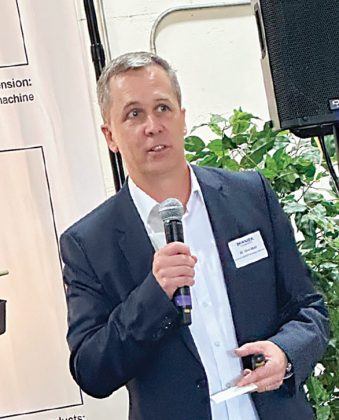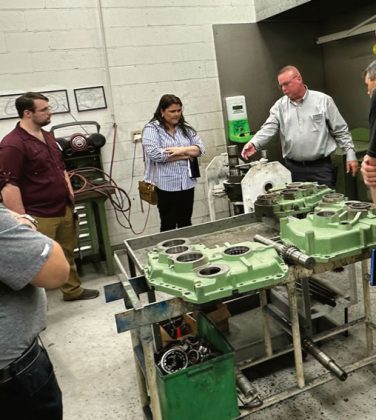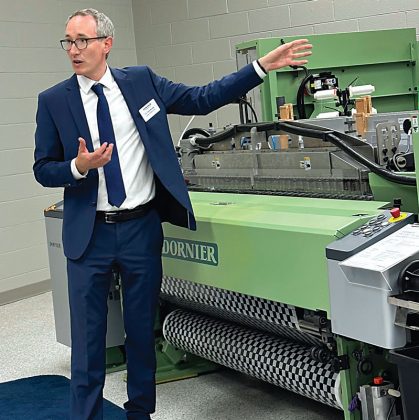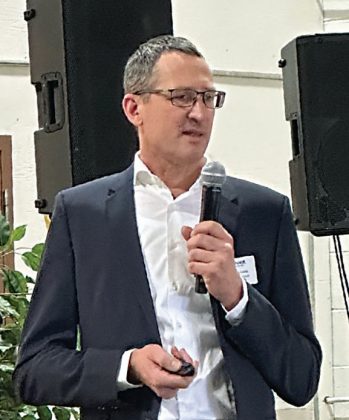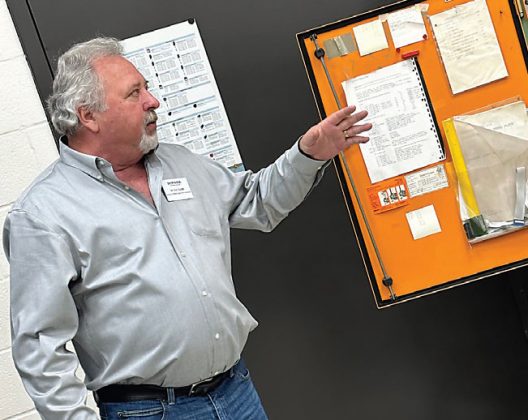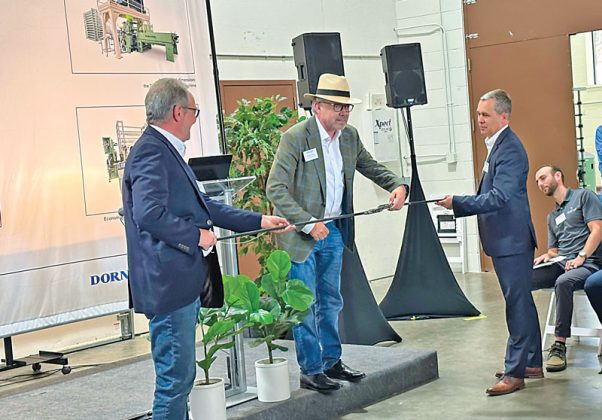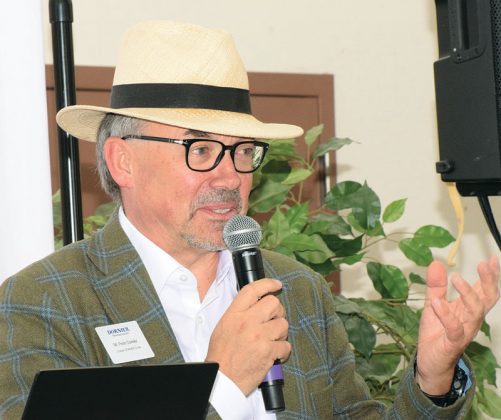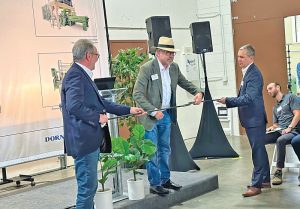
Dornier’s recent Technology Day held at its Charlotte location showcased AmDo’s capabilities for the North American market.
TW Special Report
Germany-based Lindauer Dornier GmbH (LiDo) began shipping its rapier weaving machines to the United States in the 1960s. Burlington and Milliken & Company were its first U.S. customers, and the machines quickly proved themselves and signaled a shift from shuttle looms to a shuttleless design in the United States. By 1977, more than 2,000 Dornier weaving machines were installed in North Carolina and the surrounding area; and in 1978, Field Engineer and Salesman Hans Geiger was tasked with locating a suitable place to establish American Dornier (AmDo). An old Trützschler location in Charlotte was acquired and AmDo— Dornier’s oldest subsidiary — had a home. The original 1,100-square-meter building was expanded to 3,000 square meters in 1997.
Dornier’s technologies include film stretching lines for biaxial polypropylene and polyester films; the P2 rapier and A2 air-jet weaving machines; myDoX digital solution; and Dornier Composite Systems® comprising the PROTOS® TP for unidirectional tapes, PROTOS TW for woven tape fabrics and TRITOS® for multilayer and 3D fabrics, among other technologies (See “Reintroducing DORNIER’s Composite Systems® Suite,” TW, September/October 2021).
From this original location, AmDo still serves the Americas with its 30-person team in the following areas: weaving machine sales and support; film stretching equipment support; spare parts; installation, service and personnel training; film stretching clip chain overhaul and repair; and marketing.
The company recently saw a transfer of management and the change seemed like an opportune time to host an open house — Technology Day 2023 — to showcase the capabilities and technologies avail-able in the United States. Oliver Meier recently took the helm of AmDo as executive vice president. He replaced the retiring Peter Brust who had run the operation for 22 years. During the Technology Day, Meier and Brust conducted a yarn transfer from a left-hand to a right-hand rapier in a symbolic display of the change of management. The transfer was assisted by Peter D. Dornier, LiDo CEO since 2001 who came from Germany along with other Dornier executives to participate in the Technology Day.
The event gathered guests who came from the various markets that Dornier serves — traditional weaving, composites and film production.
Meier started the day with a warm welcome for the guests, and Dornier provided a little history of the company, which actually got its start with his grandfather, Claude Dornier, in aircraft design and construction, before LiDo was established in 1950 and the company transitioned into a manufacturer of textile equipment.
Josef Klingele, head of Product Line Composite Systems, next gave an in-depth presentation highlighting all the technologies offered by Dornier.
Dornier also recognizes the importance of an aging workforce and the need to attract and train new talent. To that end, the company has an apprentice program in Germany and also offers training classes at AmDo. Martin Kaess, head of Training — known as the Ausbildungsleiter in German — explained Dornier’s offerings during Technology Day. Kaess explained the company’s dual training system available in Germany that combines theoretical instruction at vocational school two days a week with practical skills at Dornier for the remainder of the week. Trainees can earn money while gaining work experience and knowledge at school in order to become a qualified employee at the end of the apprenticeship. The program is open to international applicants as well as German nationals. The program includes employment opportunities at LiDo, AmDo, as well as a path to German citizenship. Apprenticeship paths include technical training in metals such as machinists, and industrial or construction mechanics; and in electronics or mechatronics. All programs can lead to a Bachelor of Engineering if so desired.
Kaess explained that the company also is in the process of establishing a training center set to open in 2025. The 10,000-square-foot facility will host up to 75 trainees teaching them about the latest machinery and tools, modern CAD/CAM systems, and mechanical and electrical systems using engaging projects.
AmDo also offers continuous education and training seminars in Charlotte. In 2024, seminars on the following topics will be available:
• Rapier weaving machines;
• Air-jet weaving machines;
• Electronics, both AT and FT;
• Electronic Mini Camps; and
• Supervisor training.
After the presentations, visitors participated in guided tours of the U.S. operation, which included a look at the Electronics Repair Shop, Spare Parts Department, Gear Box Repair Shop, Clip Chain Overhaul Service (CCOS), Weave Room and Tape Room. Dornier emphasizes the durability and repairability of its machines and many older models are still in operation with the assistance and care from Dornier technicians and spare parts program. In the afternoon, attendees could observe Dornier technology in action including the A2 and P2, and the Protos tape weaving machine. The company also offered demonstra-tions of its MyDox digital platform.
“The event was a great opportunity to introduce the PROTOS Tape Weaving to the North American market,” Klingele said. “The customer feedback received was very positive and encouraging and reflects the right direction for Dornier in this market sector”
“The effort we put into this event was well worth it,” Meier added. “We have been happy to receive so much positive feedback from our customers, and already are discussing the possibility of an event next year and how we can make it even more impactful for the industry.”
November/December 2023

